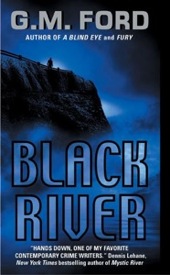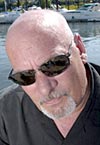Black River Runs Deep with Lies, Corruption, Justice
An Interview with G.M. Ford
By Jody Ewing
August 15, 2002
It’s been said that when it comes to the legal system, there’s no justice, “just us.”

No one knows this better than Seattle’s G.M. (Jerry) Ford, a former college Dean of Humanities and Social Sciences and now full-time detective novelist. Since his 1995 debut novel “Who in Hell is Wanda Fuca?” — the first in his Leo Waterman series — Ford has cranked out a mystery each year underscoring greed, power, moral responsibility and the circuitous road to comeuppance.
“Black River,” Ford’s eighth novel and the second in his new series, places Frank Corso — a disgraced New York Times journalist — at the center of Seattle’s most sensational murder trial. Mobster Nicholas Balagula has been charged with 63 counts of murder after the collapse of a new children’s hospital that he cut corners to build. Now a reclusive crime-writer, Corso is chosen to cover what looks like an easy victory for the prosecution. But sociopath Balagula isn’t about to go down easy, having escaped punishment before by jury tampering and unexpected deaths of witnesses.
The case doesn’t become personal, however, until Corso’s former girlfriend, photojournalist Meg Dougherty, is attacked after stumbling upon a connection between Corso’s story and one on which she’s working. Thus begins a plot-twisting story where guilty parties will pay, by hand if not by law.
 G.M. Ford |
Ford, who taught English at high school through university levels for over 20 years and a mystery writing class through the University of Washington, became interested in crime fiction after reading the Hardy Boys series at age 10. Later, The Washington Post Book World would call Ford’s ‘Leo Waterman’ character “the most likeable private eye to make the scene since Travis McGee.”
As Ford’s new loner protagonist hits the streets in search of justice, Weekender writer Jody Ewing asks Ford how Corso came about and the people who interest him — and Corso — most.
As the second book in your new Frank Corso series, can you tell me how the idea came about? Was there any particular catalyst?
Since “Fury” was my anti-serial killer book, I was looking to do something that didn’t involve one. I wanted to tell a story of a man who presumed that he was above the law; who saw the law as little more than the whining of the weak and who believed he could subvert the system in any way he chose and get away with it. That’s why I chose the Black River for a metaphor for nature’s way of evening things out…for the tendency of what goes around to indeed come around.
Of the two series, how would you say Leo Waterman and Frank Corso differ most?
Leo’s a much nicer guy than either Corso or myself. Leo represents the part of me that has a tendency to laugh first and worry about things later. Corso’s the writer part of me, who likes to stand in the corner and watch — the part of me that files away the movement of a hand or the tilt of a head. Corso’s the loner in me. The one who sits in front of a keyboard month after month, living in his own little self-manufactured world, while ignoring what the rest of his species look at as reality.
In “Black River,” how would you describe Corso’s journey and revelation?
Corso looks at a situation (Balagula’s ability to subvert the criminal justice system) and decides that the only way things are going to work out right is if he takes charge and makes it happen. As is often the case, when one pushes reality, reality has a knack for pushing back. In this case, Corso is put into a position where his own ethical code gets tested and he finds out that the distance between himself and those he considers his enemies is not as great as he had imagined.
What types of (real-life) people interest you most, and how do you go about developing them into characters?
People at the edges of society. Somebody once said that we have a leisure class at either end of our society. They’re right. Those are the people who interest me. The folks in the middle are the matrix (the yogurt) in which the story (the berries) takes place.
Your books address evil or wrongdoing on a variety of levels. That said, Anne Frank once said that in spite of everything, she believed people were basically good. Do you agree? If so, why, or why not?
I believe she’s right. I believe people have an innate sense of what’s right and wrong. No matter how old we get, every one of us occasionally says: “that’s not fair.” Doesn’t matter how many times we’ve been told that life’s not fair. Doesn’t matter how many times our own experiences prove it to us. We still have this sense of how things should be.
How do you work through a roadblock in your story?
When I encounter a stoppage, it’s my muse telling me that she doesn’t like what I’m about to write next and isn’t going to let me continue until I get it straightened out. At that point, I go looking for a scene that she will let me write and I write that. What I know for sure is that whatever means it takes to break out of the doldrums, will only take place with your ass firmly planted in front of your keyboard. You’d be amazed what seven hours a day staring at the outline on your screen will do for writer’s block. Coupla days of that and you’d rather write than eat.
Have you planned a set amount of books for this particular series?
Seems to me that somewhere between six and 10, series books begin to sound stale as hell to me. I’m about ready to write stand alones.
Why do you write?
On the Macro level: I’m a storyteller. That’s what I do. On the Micro level: I just love making sentences.
Leave a Reply